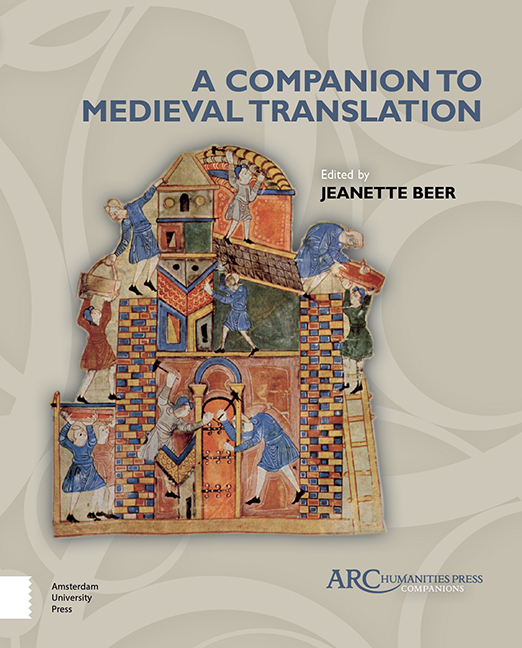Book contents
- Frontmatter
- Contents
- Acknowledgements
- Introduction
- Chapter 1 The European Psalms in Translation
- Chapter 2 The Old French Bible
- Chapter 3 Middle English Religious Translation
- Chapter 4 Bible Translation and Controversy in Late Medieval England
- Chapter 5 Medieval Convent Drama: Translating Scripture and Transforming the Liturgy
- Chapter 6 Translating Romance in Medieval Norway: Marie de France and Strengleikar
- Chapter 7 Christine de Pizan, Translator and Translation Critic
- Chapter 8 Translation, Authority, and the Valorization of the Vernacular
- Chapter 9 Vernacular Translation in Medieval Italy: volgarizzamento
- Chapter 10 Dante and Translation
- Chapter 11 Chaucer and Translation
- Chapter 12 Alchemy and Translation
- Chapter 13 Scientific Translation: A Modern Editor’s Perspectiv
- Chapter 14 Modern Theoretical Approaches to Medieval Translation
- Chapter 15 Observations on Translation by a Thirteenth-Century Maître: Li Fet des Romains
- Epilogue. Observations on Translation by the Oxford Professor of Poetry: Pearl
- General Bibliography
- Appendix
- Index
Chapter 2 - The Old French Bible
Published online by Cambridge University Press: 20 November 2020
- Frontmatter
- Contents
- Acknowledgements
- Introduction
- Chapter 1 The European Psalms in Translation
- Chapter 2 The Old French Bible
- Chapter 3 Middle English Religious Translation
- Chapter 4 Bible Translation and Controversy in Late Medieval England
- Chapter 5 Medieval Convent Drama: Translating Scripture and Transforming the Liturgy
- Chapter 6 Translating Romance in Medieval Norway: Marie de France and Strengleikar
- Chapter 7 Christine de Pizan, Translator and Translation Critic
- Chapter 8 Translation, Authority, and the Valorization of the Vernacular
- Chapter 9 Vernacular Translation in Medieval Italy: volgarizzamento
- Chapter 10 Dante and Translation
- Chapter 11 Chaucer and Translation
- Chapter 12 Alchemy and Translation
- Chapter 13 Scientific Translation: A Modern Editor’s Perspectiv
- Chapter 14 Modern Theoretical Approaches to Medieval Translation
- Chapter 15 Observations on Translation by a Thirteenth-Century Maître: Li Fet des Romains
- Epilogue. Observations on Translation by the Oxford Professor of Poetry: Pearl
- General Bibliography
- Appendix
- Index
Summary
The Old French Bible is the first vernacular translation of the entire Bible in medieval Europe, and it is orthodox; Samuel Berger established both points in 1884, as will be discussed below, and placed its composition between 1226 and 1250. It is followed by several other bible translations before 1500, which between them cast light on what the public expected of a bible translation in medieval France. Understanding the Old French Bible today involves identifying what its first audience expected. What is the thirteenth-century understanding of a bible? What is the contemporary understanding of translation? What status does a vernacular require to permit any texts at all to be written in it? It also involves being aware of what the attitude of the Church was to vernacular bibles. What, if anything, has changed in Church attitudes since the Christian Bible was first formed in Greek? Today's readers have inherited a history of bible translation composed in the sixteenth century, during the conflict between the reformers and the Catholic Church. Does this history reflect the expectations of French society in the thirteenth century, or does it need to be amended? Did those expectations change, and if so before or during the sixteenth century? It seems best to start with some definitions.
What precisely is a bible? Its Greek stem “biblion” is cognate with that of “bibliotheca,” a library, and its earliest meaning seems to have been a collection of books. The Latin “biblia” then specialized to mean a collection of religious books, and then a collection of Christian religious books. Yet the older sense of a general collection of books survives through Latin into Romance, so that we find in thirteenth-century France a satirical text entitled La Bible du Seigneur de Berzé (The Lord of Berzé's Bible), which brings together various follies of the secular world. It is not therefore surprising that the books comprising the Christian Bible remained unspecified, until the pressure of religious conflict made the sixteenth-century Counter-Reformation Council of Trent decide that a canon of Biblical books was necessary. All that can be said before then is that local custom and usage determined what books were normally included in any given copy of the Bible, which in Western Europe will typically have been in the Latin translation by St. Jerome which came to be known as the Vulgate.
- Type
- Chapter
- Information
- Companion to Medieval Translation , pp. 23 - 36Publisher: Amsterdam University PressPrint publication year: 2019



